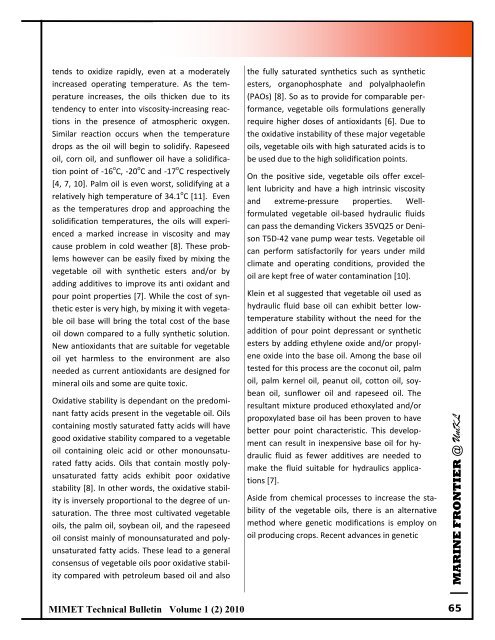click here to download - UniKL MIMET Official Website
click here to download - UniKL MIMET Official Website
click here to download - UniKL MIMET Official Website
You also want an ePaper? Increase the reach of your titles
YUMPU automatically turns print PDFs into web optimized ePapers that Google loves.
tends <strong>to</strong> oxidize rapidly, even at a moderately<br />
increased operating temperature. As the tem‐<br />
perature increases, the oils thicken due <strong>to</strong> its<br />
tendency <strong>to</strong> enter in<strong>to</strong> viscosity‐increasing reac‐<br />
tions in the presence of atmospheric oxygen.<br />
Similar reaction occurs when the temperature<br />
drops as the oil will begin <strong>to</strong> solidify. Rapeseed<br />
oil, corn oil, and sunflower oil have a solidifica‐<br />
tion point of ‐16 o C, ‐20 o C and ‐17 o C respectively<br />
[4, 7, 10]. Palm oil is even worst, solidifying at a<br />
relatively high temperature of 34.1 o C [11]. Even<br />
as the temperatures drop and approaching the<br />
solidification temperatures, the oils will experi‐<br />
enced a marked increase in viscosity and may<br />
cause problem in cold weather [8]. These prob‐<br />
lems however can be easily fixed by mixing the<br />
vegetable oil with synthetic esters and/or by<br />
adding additives <strong>to</strong> improve its anti oxidant and<br />
pour point properties [7]. While the cost of syn‐<br />
thetic ester is very high, by mixing it with vegeta‐<br />
ble oil base will bring the <strong>to</strong>tal cost of the base<br />
oil down compared <strong>to</strong> a fully synthetic solution.<br />
New antioxidants that are suitable for vegetable<br />
oil yet harmless <strong>to</strong> the environment are also<br />
needed as current antioxidants are designed for<br />
mineral oils and some are quite <strong>to</strong>xic.<br />
Oxidative stability is dependant on the predomi‐<br />
nant fatty acids present in the vegetable oil. Oils<br />
containing mostly saturated fatty acids will have<br />
good oxidative stability compared <strong>to</strong> a vegetable<br />
oil containing oleic acid or other monounsatu‐<br />
rated fatty acids. Oils that contain mostly poly‐<br />
unsaturated fatty acids exhibit poor oxidative<br />
stability [8]. In other words, the oxidative stabil‐<br />
ity is inversely proportional <strong>to</strong> the degree of un‐<br />
saturation. The three most cultivated vegetable<br />
oils, the palm oil, soybean oil, and the rapeseed<br />
oil consist mainly of monounsaturated and poly‐<br />
unsaturated fatty acids. These lead <strong>to</strong> a general<br />
consensus of vegetable oils poor oxidative stabil‐<br />
ity compared with petroleum based oil and also<br />
<strong>MIMET</strong> Technical Bulletin Volume 1 (2) 2010<br />
the fully saturated synthetics such as synthetic<br />
esters, organophosphate and polyalphaolefin<br />
(PAOs) [8]. So as <strong>to</strong> provide for comparable per‐<br />
formance, vegetable oils formulations generally<br />
require higher doses of antioxidants [6]. Due <strong>to</strong><br />
the oxidative instability of these major vegetable<br />
oils, vegetable oils with high saturated acids is <strong>to</strong><br />
be used due <strong>to</strong> the high solidification points.<br />
On the positive side, vegetable oils offer excel‐<br />
lent lubricity and have a high intrinsic viscosity<br />
and extreme‐pressure properties. Well‐<br />
formulated vegetable oil‐based hydraulic fluids<br />
can pass the demanding Vickers 35VQ25 or Deni‐<br />
son T5D‐42 vane pump wear tests. Vegetable oil<br />
can perform satisfac<strong>to</strong>rily for years under mild<br />
climate and operating conditions, provided the<br />
oil are kept free of water contamination [10].<br />
Klein et al suggested that vegetable oil used as<br />
hydraulic fluid base oil can exhibit better low‐<br />
temperature stability without the need for the<br />
addition of pour point depressant or synthetic<br />
esters by adding ethylene oxide and/or propyl‐<br />
ene oxide in<strong>to</strong> the base oil. Among the base oil<br />
tested for this process are the coconut oil, palm<br />
oil, palm kernel oil, peanut oil, cot<strong>to</strong>n oil, soy‐<br />
bean oil, sunflower oil and rapeseed oil. The<br />
resultant mixture produced ethoxylated and/or<br />
propoxylated base oil has been proven <strong>to</strong> have<br />
better pour point characteristic. This develop‐<br />
ment can result in inexpensive base oil for hy‐<br />
draulic fluid as fewer additives are needed <strong>to</strong><br />
make the fluid suitable for hydraulics applica‐<br />
tions [7].<br />
Aside from chemical processes <strong>to</strong> increase the sta‐<br />
bility of the vegetable oils, t<strong>here</strong> is an alternative<br />
method w<strong>here</strong> genetic modifications is employ on<br />
oil producing crops. Recent advances in genetic<br />
| MARINE FRONTIER @ <strong>UniKL</strong><br />
65



